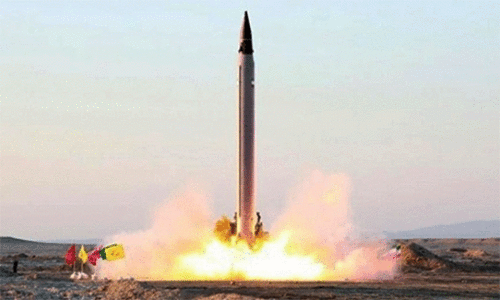President Donald Trump raised the stakes in Washington's increasingly tense stand-off with Iran on Friday, slapping fresh sanctions on Tehran's weapons procurement network.
Officials said the new measures were in response to Iran's recent ballistic missile test and its alleged support for Houthi rebels in Yemen, who recently targeted a Saudi warship.
The sanctions do not, officials say, mark a retreat from US commitments under the Iran nuclear deal to lift measures targeting Tehran's alleged bid to build a nuclear warhead.
But Trump has made no secret of his contempt for the accord, which his predecessor Barack Obama approved in July 2015, and officials said Friday's new measures would not be the last.
“Iran is playing with fire -- they don't appreciate how 'kind' President Obama was to them. Not me!” Trump tweeted Friday.
US intelligence and Treasury officials are constantly scrutinizing Iran's networks, looking for evidence of extremist funding and advanced weapons procurement.
The immediate trigger for the sanctions was Iran's test, on Sunday, of a ballistic missile that US officials judge to have been capable of one day carrying a nuclear warhead.
But the latest detailed list of entities added to the list has clearly been in preparation for some time, and the White House has said “nothing is off the table” in dealing with Iran.
“We are undertaking a larger strategic review,” a senior US administration official told reporters.
“The launch of the missile was the triggering event.”
Washington is also concerned about attacks by Houthi rebels, a powerful faction in Yemen's civil war which US intelligence believes is armed and supported by Iran.
This week Houthi forces attacked a Saudi warship operating off Yemen and on Friday a US official said: “We're very concerned about freedom of navigation in the Bab el-Mandeb area.”
The senior official said Iran was “not necessarily responsible for every tactical decision” made by Houthi forces, but that it will be made to bear responsibility for its “proxies.”
The United States has already protested about Iran's missile test at the United Nations, arguing it was “inconsistent” with UN Security Council Resolution 2231.
Angry taunts
But Russia, which is allied with Iranian forces in its defense of the Syrian government, is unlikely to allow new international sanctions to target Tehran.
US Treasury officials hope that preventing Iran's networks in Lebanon and China from buying US goods or using the US financial system will curtail their activity.
Nevertheless, Trump's pronouncements on the 2015 nuclear deal, and Iran's angry response that his taunts as “baseless” and “provocative,” have raised fears of an imminent showdown.
The nuclear deal obliged Iran to curtail its nuclear program and halt any weapons research in exchange for relief from US and international sanctions targeting the sector.
It was agreed between Tehran and six powers - China, Britain, France, Germany, Russia and the US - and Obama's White House hailed it as a blow against nuclear proliferation.
Trump, Israel and many US foreign policy hawks argue instead that the deal was too soft and that the windfall Iran won with sanctions relief will be funneled to terror networks.
If the deal collapses, however, some observers fear a nuclear arms race in the Middle East. US officials insist that the new sanctions have no bearing on the deal - for now.
“Iran has to determine its response to our actions. Iran has a choice to make,” a senior administration official said.
“We are going to continue to respond to their behavior in an ongoing way and at an appropriate level to continue to pressure them to change their behavior.”
There will be many in Washington arguing for tougher action, and hawks in Congress have been calling for broad measures to target entire sectors of Iran's fragile economy.
Severe price
“The designations are a good start but the procurement networks they target can be easily reconstituted,” said Mark Dubowitz, CEO of the Foundation for Defense of Democracies.
“Unless the Iranian regime pays a severe price for its malign activities, they are unlikely to stop.”
Think tank the Eurasia Group warned that the fate of the nuclear deal itself is in US hands and will be decided by “the harshness of the sanctions Trump puts in place.”
If he sticks to designating new individuals for existing sanctions as he did on Friday, the deal will probably hold, “but it is a close call,” the group warned in a briefing note.
If he aims for broader sectoral sanctions it may fall apart.
Friday's list named three trading networks and individuals allegedly involved in supplying Iran's missile program.
One against already-sanctioned Iranian businessman Abdollah Asgharzadeh involves Chinese companies and suppliers, mainly the Cosailing Business Trading Company based in Qingdao.
Other groups named include the Rostanian network based in the Gulf and Lebanon-based Hasan Dehghan Ebrahimi, whose firm allegedly launders money and goods for the Hezbollah militia.














































